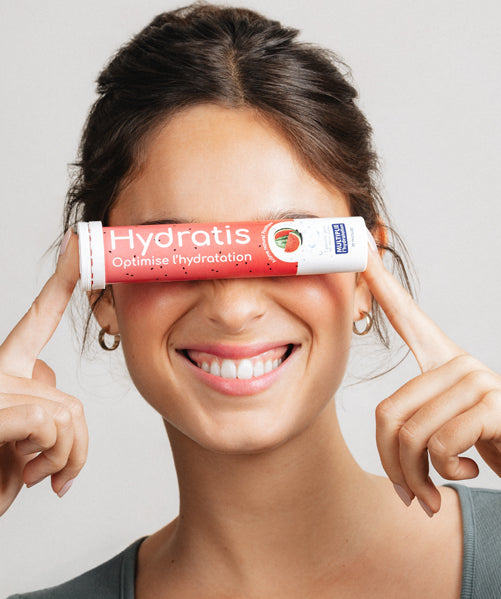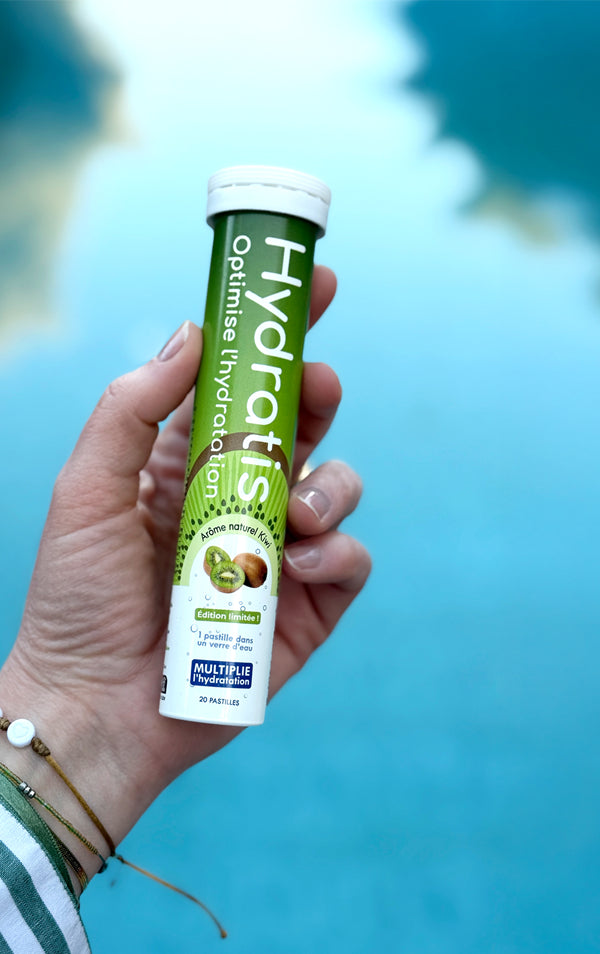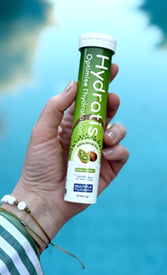A bottle of lukewarm water, a few drops of lemon and a pinch of salt: behind this very simple recipe lies a drink that is generating more and more interest.
Salted lemon water isn't just an old wives' tale or a health fad. It's a combination that intrigues both wellness enthusiasts and athletes. Flavoring the water , providing electrolytes, supporting digestion: the benefits are numerous.
Before incorporating it into your routine, it's best to understand its effects, benefits, and limitations. While lemon water with salt has its advantages, it's not necessarily suitable for every situation or everyone.
Why drink water with lemon and salt?
Mixing salt and lemon in a glass of water may seem strange, yet this practice is ancient. In India, for example, shikanji (lemon, water, salt, sugar, sometimes cumin or ginger) has been consumed for centuries to refresh and revitalize, especially during periods of intense heat.
In medicine In Ayurveda , drinking warm lemon water on an empty stomach in the morning is associated with stimulating digestive fire, eliminating toxins from the body, and strengthening natural defenses. This logic is also echoed in naturopathy Modern : Salted lemon water is often described as a hydrating and remineralizing drink.
The difference with regular lemon water lies in the added mineral content. By adding natural salt, you enrich the drink with Electrolytes . A mixture that, in certain situations, can be more effective than a simple glass of lemon water.
Composition and properties of lemon

Lemon is a true concentrate of bioactive compounds . It is rich in:
- Vitamin C : a powerful ally of the immune system, also known for its action in the production of collagen, an essential protein for the skin.
- Flavonoids : antioxidants that protect your cells against oxidative stress.
- Organic acids : citric acid, in particular, stimulates the production of digestive juices and improves the absorption of certain minerals such as iron.
In addition to these elements, this citrus fruit also contains electrolytes such as potassium and magnesium, which contribute to the regulation of blood pressure and muscle function.
Salt in lemon water: why add it?
Adding a pinch of salt to lemon water provides electrolytes. These minerals play a key role in fluid balance, nerve transmission, and muscle contraction. In certain situations, particularly after heavy sweating or upon waking, this mixture can support good hydration, although it doesn't replace a drink specifically formulated to optimize hydration.
The choice of salt is important. Unrefined salts, such as sea salt or Himalayan pink salt, are not limited to sodium: they can also provide magnesium, potassium, and trace elements like zinc, iron, and calcium. These contributions are modest but contribute to the mineral content of the beverage, unlike refined table salt, which is almost exclusively composed of sodium chloride.
Potential benefits of salted lemon water
Cardiovascular support
Depending on the type of salt used, this infusion can have different effects on your blood pressure. The potassium and magnesium from natural salt help balance blood pressure, while a excess sodium from refined salt It can raise it. When properly dosed, this beverage can therefore promote blood circulation and cardiac performance.
An antioxidant drink
When you drink this preparation, the antioxidants it contains neutralize free radicals generated by metabolism, pollution, or stress. This protects your cells from premature aging and certain chronic conditions.
Can it prevent certain cancers?
Of the studies They highlighted the potential anti-cancer effects of flavonoids and vitamin C, but the results remain preliminary. Simply drinking this mixture is not enough to reduce the risk of cancer or to treat it.
Weight loss and improved digestion
Often marketed as a "detox" drink, the water-lemon-salt mixture is said to aid digestion and eliminate toxins thanks to citric acid, which stimulates bile production. It also provides a mild feeling of fullness that can help curb snacking. However, no solid studies have demonstrated a direct link between this drink and significant weight loss.
Immune system boost
It has been shown that the Vitamin C strengthens the immune system by stimulating several key cells (neutrophils, lymphocytes, macrophages). A deficiency increases vulnerability to infections, while the body's needs increase during illness. It does not replace a balanced diet, but it contributes to a boost of energy during periods of fatigue or convalescence.
Alkalize the body
Although it tastes acidic, this citrus fruit releases alkalizing residues ( substances that help neutralize excess acidity in the body ) after metabolism, thanks to its high potassium and magnesium content. Combined with the minerals present in salt, these help counteract the effects of a diet too rich in acidifying foods (red meat, coffee, refined grains, added sugars, etc.).
Diuretic and detoxifying effect
Thanks to citric acid and potassium, this drink gently stimulates kidney function. It promotes the elimination of excess water and can relieve feelings of bloating or heavy legs. It's important to remember that lemon does not directly regulate blood pH : this function is performed by the kidneys themselves, which constantly maintain acid-base balance.
Lemon water (with or without salt): precautions and warnings

Are there any side effects?
The acidity of lemon can weaken tooth enamel. and cause tooth sensitivity. This risk increases if the drink is too concentrated or consumed daily. As for citric acid, it can potentially slow gastric emptying. and cause a feeling of discomfort or digestive irritation in people who have a sensitive stomach.
Contraindications
Despite its many benefits, salted lemon water isn't suitable for everyone. If you suffer from high blood pressure, oxalate kidney stones, or certain heart conditions, consult your doctor to see if it's appropriate for your routine. Similarly, if you have a stomach ulcer or other acid-related digestive issues such as... reflux If you have gastroesophageal issues , avoid consuming it or dilute it further.
Precautions to take
Here are a few simple tips to help you limit side effects and risks:
- Use a straw to protect your teeth and rinse your mouth after consumption.
- Prepare your drink with lukewarm water to better dissolve the salt and facilitate digestion.
- Limit your consumption to avoid exceeding your daily sodium intake.
- Drink it preferably early in the day.
Frequently Asked Questions (FAQ)
Is it good to drink lemon water every day?
Yes, provided you don't overdo it. This preparation provides vitamin C and helps with hydration. However, its acidity can weaken tooth enamel if you consume it too frequently.
Is it good to drink water with lemon and salt?
Yes, but only occasionally, after prolonged physical exertion or in hot weather to replenish electrolytes. However, it's not essential for daily consumption. Be sure to choose the right ingredients (fresh lemon, unrefined salt, good quality water).
Why put salt in lemon?
Rich in sodium, salt promotes water retention and contributes to electrolyte balance. Combined with lemon, it helps to better hydrate the body in cases of significant water and mineral loss.
Conclusion: Salted lemon water, a simple elixir to use
Natural and easy to prepare, water with lemon and salt is increasingly popular for its potential health benefits, particularly for hydration, digestion, and immunity. Consumed in moderation as part of your usual wellness routine, this drink allows you to enjoy the benefits of lemon and salt.
However, you should in no way consider it a miracle cure for weight loss, liver cleansing, or cancer prevention. Its consumption should be part of a healthy lifestyle that includes a balanced diet, regular physical activity, and quality sleep.
The homemade mixture of water, lemon and salt should also not be confused with an oral rehydration solution (ORS), used in medicine to treat moderate to severe dehydration.
Bibliography
Anju, & Idris, M. (2020) . Shikanji or Sikanjabeen - A Unani pharmacopoeial dosage form. International Journal of Health Sciences and Research, 10 (9), 304-309.
https://www.ijhsr.org/IJHSR_Vol.10_Issue.9_Sep2020/41.pdf
Cervoni, F. (2024, November 6) . Naturopathy. PasseportSanté.
https://www.passeportsante.net/fr/Therapies/Guide/Fiche.aspx?doc=naturopathie_th
James, L.J., & Shirreffs, S.M. (2015) . Effect of electrolyte addition to rehydration drinks consumed after severe fluid and energy restriction. J ournal of strength and conditioning research , 29 (2), 521–527. https://doi.org/10.1519/JSC.0000000000000657
Saini, R.K., Ranjit, A., Sharma, K., Prasad, P., Shang, X., Gowda, K.G.M., & Keum, Y.S. (2022). Bioactive Compounds of Citrus Fruits: A Review of Composition and Health Benefits of Carotenoids,
Flavonoids, Limonoids, and Terpenes. A ntioxidants (Basel, Switzerland) , 11 (2), 239. https://doi.org/10.3390/antiox11020239
He, F. J., & MacGregor, G. A. (2009) . A comprehensive review on salt and health and current experience of worldwide salt reduction programs. J ournal of human hypertension , 23 (6), 363–384. https://doi.org/10.1038/jhh.2008.144
Carr, A.C., & Maggini, S. (2017) . Vitamin C and Immune Function. Nutrients , 9 (11), 1211. https://doi.org/10.3390/nu9111211
Rodríguez-García, C., Sánchez-Quesada, C., & J Gaforio, J. (2019). Dietary Flavonoids as Cancer Chemopreventive Agents: An Updated Review of Human Studies. Antioxidants (Basel, Switzerland), 8(5), 137 . https://doi.org/10.3390/antiox8050137
Stafne, EC, & Lovestedt, SA (1947, May 1). Dissolution of tooth substance by lemon juice, acid beverages and acids from some other sources . Journal of the American Dental Association , 34 (9), 586–592. https://doi.org/10.14219/jada.archive.1947.0133
Terry, P., Lagergren, J., Wolk, A., & Nyrén, O. (2000) . Reflux-inducing dietary factors and risk of adenocarcinoma of the esophagus and gastric cardia. Nutrition and cancer , 38 (2), 186–191. https://doi.org/10.1207/S15327914NC382_7






